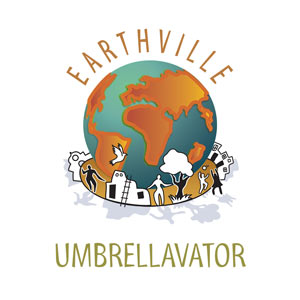So you have an inspiring idea for making the world (or some part of it) a better place? Great! If your idea involves activities that are legally recognized as charitable activities, it may be beneficial to conduct them under the legal umbrella of a nonprofit organization with charitable status.
If you’re not very experienced with starting a nonprofit, you’ll find that there’s a lot of jargon to learn and a lot of hoops to jump through, and the legal landscape can be a bit complicated. That’s why Earthville is providing this collection of tips and resources to help guide you through the process of starting a new nonprofit project and enjoying the benefits of charitable status (including tax-deductible contributions to your project). Note that, since we’re touching on issues of law here, we have to give a disclaimer: We’re not giving legal advice; we’re just sharing what we’ve learned from our own years of experience in the hopes that it might help those of you who are just starting down this path, and our suggestions are not a substitute for the advice of a qualified legal professional.
Preliminary Questions
Let’s start with a few basic questions.
1. What kinds of activities qualify as tax-exempt and charitable?
The answer to this question varies from one country to the next, but in many countries (including the UK, the USA, India, et al.) the basic answer is that organizations that carry out activities exclusively (or almost exclusively) for educational, charitable (social welfare), literary, medical, religious, or scientific purposes may qualify for nonprofit and charitable status and the benefits that go with it. Most schools, places of worship, and hospitals qualify for charitable status automatically, and there is a great variety of other organizations that may be granted charitable status if they meet certain criteria (such as being publicly supported or earning most of their revenue through charitable-purpose activities). Covering all the details of this question is beyond the scope of this article, but there are plenty of resources online and in most countries one can find legal help books that walk you through the particulars.
Note that there is an important difference between tax-exempt status and charitable status. “Tax-exempt” means your organization is not required to pay income taxes on the revenue it receives though its tax-exempt activities. “Charitable” refers to activities that are specifically recognized by law as being in the public interest, and therefore there is often a provision for allowing tax deductions for charitable donations.
It’s important to understand that are some activities that are considered tax-exempt but not charitable. In the USA, for example, political activities are generally considered tax-exempt but not charitable, so political organizations don’t pay income tax, but donations to those organizations are generally not tax-deductible (of course there are loopholes in these laws, but this is the general rule). And if your questions aren’t clearly answered online or in books, you may need to consult a legal expert who specializes in nonprofit law.
Once you have established that your proposed activities are considered nonprofit and charitable in your area, you’re ready to move on to the next question.
2. What are the legal entity types that can operate as nonprofit/charitable organizations?
Again, the answer to this varies by country, and in the US it even varies from state to state. For example, there are some states in the US that recognize LLCs as a valid option for nonprofit organizations, whereas others recognize only nonprofit corporations or unincorporated associations.
But, in general, most every country allows certain types of corporations to be recognized as nonprofit and charitable organizations. The corporate legal entity has been used for centuries as the primary entity type for nonprofit organizations. Many localities also allow small, unincorporated associations to operate as recognized nonprofits. There may be other legal entities that are allowable in your area, so it’s best to consult the Web, a book, or a lawyer.
3. Does my nonprofit project need corporate status?
That’s a very good question. There are pros and cons to working within the corporate legal entity.
On the positive side, corporate status typically provides the officers, directors, and employees of the corporation a degree of protection from personal liability in case of legal action against the organization (in other words, if the organization gets sued, individuals within the organization generally can’t be held liable, except in certain cases of willful misconduct or gross negligence). Also, in some cases, corporate status can increase the confidence of potential donors and grantmakers by creating the impression that your organization is more “serious.”
On the negative side, the benefits and protections of corporate status come with a significant load of archaic protocol that must be followed strictly, and a lot of paperwork to document the quorums, the meeting minutes, the notices, and the records of yays and nays of every significant decision. Sometimes one feels like one should be wearing a white powdered wig… And, more to the point, attending to corporate protocols can consume an immense amount of time (and often a non-trivial amount of money) that most people would rather spend doing something else.
So, the short answer is that, in many (if not most) cases it’s really useful to have corporate status, but it can be expensive and time-consuming for young organizations with limited staff and funding.
Fortunately, it isn’t always necessary to form and manage your own corporation in order to enjoy the benefits of corporate status, because you may be able to conduct your project within an existing nonprofit corporation. Which brings us to the next question…
4. Should I form a new nonprofit corporation or conduct my project under the auspices of another existing nonprofit?
That’s another good question, and one that depends very much on your project and circumstances.
Perhaps the first question to consider is whether you’re reinventing the wheel unnecessarily, because there might already be a nonprofit that’s doing what you want to do, and it might be possible to volunteer for them or get a job with them and work within the context they’ve already done all the work to set up. But sometimes there’s a good reason to start something new.
In either case, it is very common practice for new nonprofit projects to begin life by working within another nonprofit organization. This is often structured as a relationship known as “fiscal sponsorship,” in which an established nonprofit corporation creates a temporary agreement with the founders of a new nonprofit project formalizing a clearly-defined legal arrangement that allows the new project certain privileges (including the benefits of the sponsoring organization’s corporate and charitable status) in exchange for an administrative fee (generally ranging between 6% and 25% of the project’s revenue). There are also other types of legal relationships that can be set up for this purpose, depending on circumstances and preferences.
Of the many nonprofit projects that start off working under the corporate umbrella of another organization, eventually some of those projects spin off to incorporate on their own (if and when the need warrants it and they can afford to do it). Others may find it’s more advantageous to keep operating within their host nonprofit. Provided your initial agreement with the host nonprofit/fiscal sponsor clearly gives you the right to spin off on your own at some point (and take any assets you may have acquired with you), your options will be open if your needs change down the road.
Whether or not it’s worth it for you to incorporate on your own (either from the start or further down the line) may depend in part on the resources available to you. If you can afford to hire lawyers for consultations and paperwork, and if you can afford to hire an administrative staffer to deal with all the paperwork and reporting, then you might find it worthwhile to incorporate on your own, especially if you are unable to find a mission-aligned nonprofit organization that seems like a good home for your project. If you can find an organization that seems like a great match, however, you might find it more advantageous to work within that organization and let them take care of most of the boring legal and administrative stuff so more of your time will be free to focus on doing the work that inspires you.
 If you should decide that you’d prefer to conduct your project under the auspices of another existing nonprofit/charitable organization, the Earthville Network might be able to help you. The Earthville Umbrellavator is a project supporting emerging social entrepreneurs with promising charitable project ideas that are aligned with Earthville’s mission and values.
If you should decide that you’d prefer to conduct your project under the auspices of another existing nonprofit/charitable organization, the Earthville Network might be able to help you. The Earthville Umbrellavator is a project supporting emerging social entrepreneurs with promising charitable project ideas that are aligned with Earthville’s mission and values.
Check out the Earthville Umbrellavator page for more information.
There are also other organizations that provide fiscal sponsorship and administration services for nonprofit projects, which you can find by searching the Internet for “nonprofit fiscal sponsorship.” Note that some of these organizations have widely varying fees for their services, so be sure you understand what all the fees are and what you’re getting in return.
The Visioning Stage
In our next article in this section, we’ll explore the process of clarifying the vision for your nonprofit project and articulating it in the customary form of a mission statement, vision statement, supplemented by objectives and strategies. We’ll also look at the importance of clarifying the values and culture of your project.
If you have a specific question relevant to this topic, feel free to post it in the comments below.
Get Involved
We welcome you to explore Earthville, find your place within it , and add what only you can bring.
- Sign up: Drop by the “Earthville Embassy” page to become a “Citizen of Earthville.”
→ Join - Explore: Make your way around the Earthville website to discover what inspires you.
→ Quick Tour • Stories • Resources for Global Citizens - Participate: Connect with the Earthville community, online and on the ground.
→ Social • Events • Volunteer • Participate - Chip in: Give whatever you can to support our charitable work. Any amount helps.
→ Give

No comments yet.